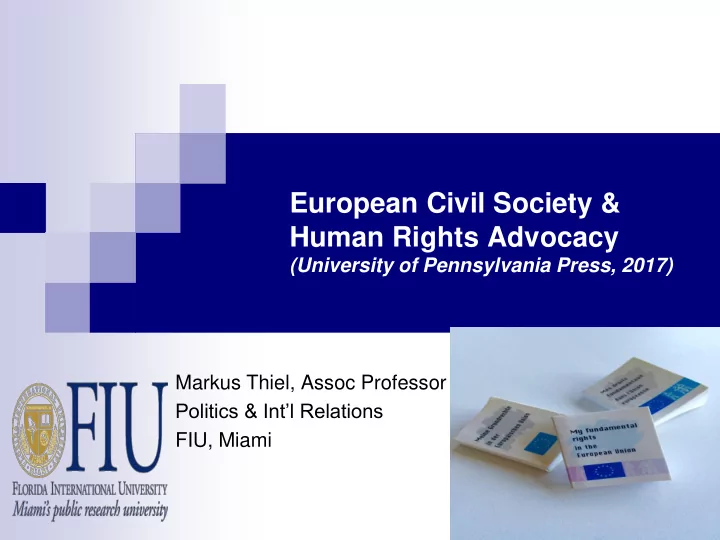

European Civil Society & Human Rights Advocacy (University of Pennsylvania Press, 2017) Markus Thiel, Assoc Professor Politics & Int’l Relations FIU, Miami
Introduction EU as timely case-study: WW2 & ‘normative power Europe’ (Manners 2002) external promoter+ civil society organizations (CSOs, 2001) legal-political guidelines (now binding: Charter of ‘Fundamental Rights’ ; Art 11 Lisbon Treaty: ‘participatory democracy’; 2007/8: Fundamental Rights Agency: http://fra.europa.eu/en) > Dynamic but challenging public policy field
Sociological institutionalist framework: The book.. evaluates the degree to which input-legitimacy ( Scharpf 1999 ), i.e. the meaningful insertion of CSOs through participatory governance mechanisms, exists in Agency proposes that institutional embeddedness of the CSO Platform & agency determines quality of transnat’l human rights advocacy ( throughput legitimacy : accountability, transparency , inclusiveness, Schmidt 2013 ) asks if the overall role of CSOs in the Platform’s work leads to more accountable human rights policy development within EU (≠ more human rights; output legitimacy )
The FRP’s unique position FRA operates as research-based information, observation & support center for/subordinate to Eur Commission + ‘rights - pedagogical function’ for public+civil society: FR CSO Platform Transnational aspect of Platform: EU-level and national-level CSOs (power differentials!) Interviews w/CSOs & EU officials (n=24), CSO-Survey (n=66, 30% response rate) & Participant Observation at Annual Mtg
Survey results: Input legitimacy: 50% receive EU funding, of those 52% express certain dependency Form of Association with FRP/FRA: 54% applied,30% invited by FRA Openness of FRA compared to Commission: 49% better, 50% same
Throughput legitimacy: Platform efficient in eliciting civil society input? 62% of survey participants agreed, while 38% did not How CSOs (would like to) view FRA 70% want more competencies,30% Satisfied with current status Importance of EU-level networking: 56% both equally important; 33% favor EU-level
Coordination among CSOs
Output legitimacy: FRA ‘somewhat’ successful (72%), followed by 26% that judged agency work fruitful (26%), and 2% that did not Left: More important: input- or output-legitimacy? 60% say both needed equally Right: Identification of difficult cooperation partners: 34% nat’l Govts, 21% EU Council
Conclusion/Discussion Input-Legitimacy (quality of input): evidence attests to - broadening of sectoral horizons and expansion of opportunity structures. But can 300+ Platform groups join in agenda-setting strategies with different constitutive characteristics (domestic or transnational; membership or foundation) & ideas of human rights? >’diversity as legitimacy’ contradicting input legitimacy? Throughput legitimacy (quality of interactions): - Value of the Platform and agency is largely positively evaluated, but more agency autonomy requested, and issue of 2-level advocacy Output-Legitimacy (quality of results): measured by - improvements in legislative and political output of the union > ambivalent: Reports helpful for advocacy & accountable policy development, although FRA could be stronger political advocate (+ Euro- & Refugee-crisis) >>>all 3 aspects are significant in this volatile policy area!
Social Justice? Difficult structural issues… Eurocrisis: http://www.bertelsmann-stiftung.de/en/topics/aktuelle- meldungen/2017/november/nosedive-halted-recovery-on-the- labour-market-improves-social-justice-in-the-eu/ NGOs push against welfare cuts Refugee crisis: EU initially neglected, then securitized refugees; NGOs, incl FRA/FRP ones, have worked towards upholding human rights (e.g. establishing ‘fundamental rights trainings/officers’ on patrol boats
Recommend
More recommend